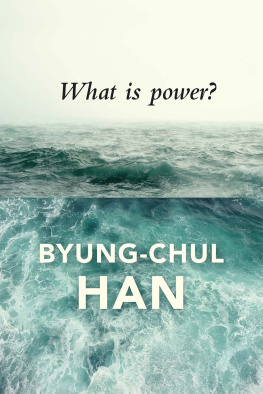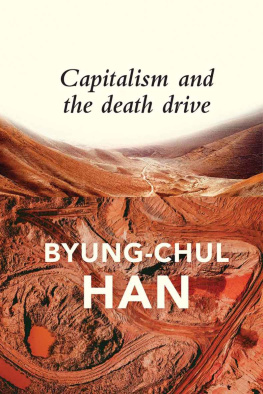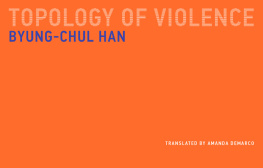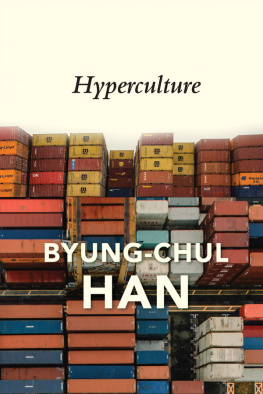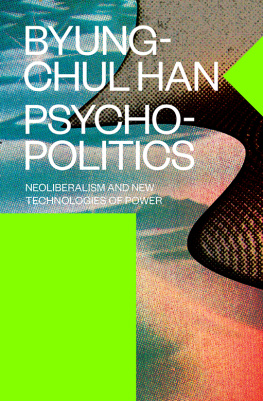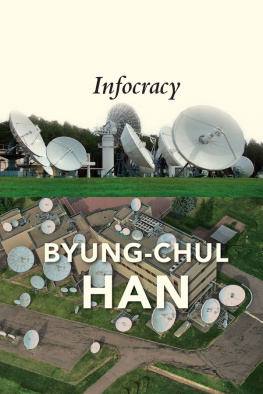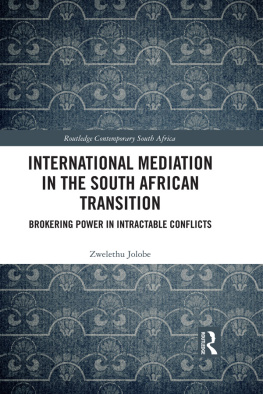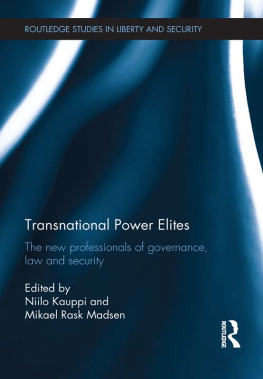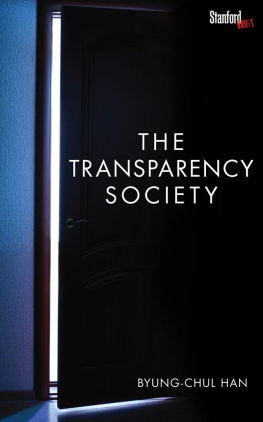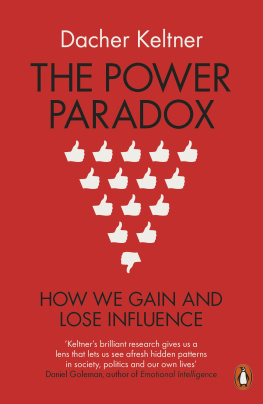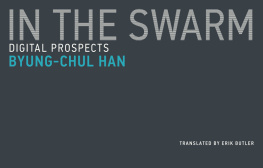Contents
Guide
Pages

What is Power?
Byung-Chul Han
Translated by Daniel Steuer
polity
First published in German as Was ist Macht? Philipp Reclam jun. GmbH & Co. KG, Stuttgart, 2005
This English edition Polity Press, 2019
Polity Press
65 Bridge Street
Cambridge CB2 1UR, UK
Polity Press
101 Station Landing
Suite 300
Medford, MA 02155, USA
All rights reserved. Except for the quotation of short passages for the purpose of criticism and review, no part of this publication may be reproduced, stored in a retrieval system or transmitted, in any form or by any means, electronic, mechanical, photocopying, recording or otherwise, without the prior permission of the publisher.
ISBN-13: 978-1-5095-1613-1
A catalogue record for this book is available from the British Library.
The publisher has used its best endeavours to ensure that the URLs for external websites referred to in this book are correct and active at the time of going to press. However, the publisher has no responsibility for the websites and can make no guarantee that a site will remain live or that the content is or will remain appropriate.
Every effort has been made to trace all copyright holders, but if any have been inadvertently overlooked the publisher will be pleased to include any necessary credits in any subsequent reprint or edition.
For further information on Polity, visit our website: politybooks.com
PREFACE
When it comes to the concept of power, theoretical chaos still reigns. While the existence of the phenomenon itself cannot be doubted, the concept remains altogether ambiguous. For some, it means repression; for others, it is a constructive element in communication. Legal, political and sociological notions of power remain unreconciled. Power is sometimes associated with freedom, sometimes with coercion. For some power is based on common action, for others on struggle. Some draw a sharp line between power and violence. For others, violence is just a more extreme form of power. At one moment power is associated with the law, at another with arbitrariness.
Given this theoretical confusion, we shall look for a flexible concept of power that is able to unite these divergent ideas. Thus, the task is to formulate a basic form of power from which we can, by modifying its inner structural elements, derive the different forms in which power may appear. This is the theoretical approach the book pursues, and the book aims, in this way, to deprive power of that power it has on account of the fact that we do not fully understand what it actually is.
Notes
See Luhmann, Klassische Theorie der Macht: Kritik ihrer Prmissen, p. 149.
The Logic of Power
Power is usually defined as a causal relation: the power of the ego is the cause which effects a particular behaviour in an alter against the latters will. It enables the ego to impose his or her decisions without having to show any consideration for the alter. Thus, the egos power limits the alters freedom. The alter suffers the will of the ego as something alien. This common idea of power does not do justice to its complexity. Processes of power are not exhausted by attempts to break resistance or to compel obedience. Power does not have to take the form of coercion. The fact that there is a will forming that opposes the holder of power actually bears witness to the weakness of that power. The more powerful power is, the more silent is its efficacy. Where it needs to draw special attention to itself, it is already weakened.
Neither does power consist in neutralizing the will. Causality does not allow for an adequate description of it, because in this case power does not operate like a mechanical push that simply moves a body out of its original trajectory. Rather, its effect is like that of a field in which the body moves out of its own accord, so to speak.
The model of coercion does not do justice to the complexity of power. Power as coercion consists in enforcing ones own decisions against the will of the other. It therefore displays only a very low degree of mediation between ego and alter, which relate antagonistically to each other. The ego is not received in the soul of the alter. The form of power which does not exercise its effects against the intended actions of the other but from within these contains more mediation. For a superior power is one that forms the future of the other, not one that blocks it. Instead of proceeding against a particular action of the alter, it influences or works on the environment of the alters actions even before they take place, so that the alter voluntarily decides in favour of the egos will, even without the threat of any sanctions. Without the use of any violence [Gewaltausbung], the holder of power takes his place in the soul of the other.
The causal model is incapable of describing complex relations. Even organic life as such cannot be understood in terms of causal relations. As opposed to a lifeless and passive thing, an organism does not allow an external cause to have an effect on it without the organism contributing to it. Rather, it reacts independently to the cause. This capacity to give an independent response to an external trigger is characteristic of the organic. A lifeless thing, by contrast, does not respond. The specificity of life is that it cuts short the external cause, transforms it and lets it begin something new in itself. Life may be dependent on food, but food is not the cause of life. If we can talk of a cause at all in this context, then it is life itself which has the power to turn what is external to it into a cause of specific organic processes. These processes are therefore not simple repetitions of the external cause on the inside. Rather, they are independent achievements, independent decisions of life. It reacts independently to the outside. An external cause is but one of many possible triggers that life itself turns into a cause. Life never just passively suffers such causes. An external cause never achieves an effect without a contribution or decision of the inner. There is no immediate continuation of the outer into the inner, as in the case of the transmission of kinetic energy from one body to another. The category of causality is even less suitable for a description of mental life. The complexity of mental life determines the complexity of power processes which cannot be translated into linear relations between cause and effect. This complexity distinguishes power from physical violence, where a simple causality between force, or strength, and effect can be given. This reduction in complexity probably constitutes the advantage of physical violence.
The complex processes of power cannot be adequately described with simple arithmetic. A slight countervailing power may inflict severe damage on a power of superior strength. This affords even a weak opponent great importance, and thus power. Specific political constellations may also give a lot of power to weak parties or nations. And complex interdependencies mean that there is reciprocity of power. If the ego needs the cooperation of the alter, a dependence of ego on alter is the result. The ego can no longer formulate and enforce his or her demands without taking the alter into consideration, because the alter has the option of reacting to the

